VoIP vs Traditional Phone Services: 5 Key Differences
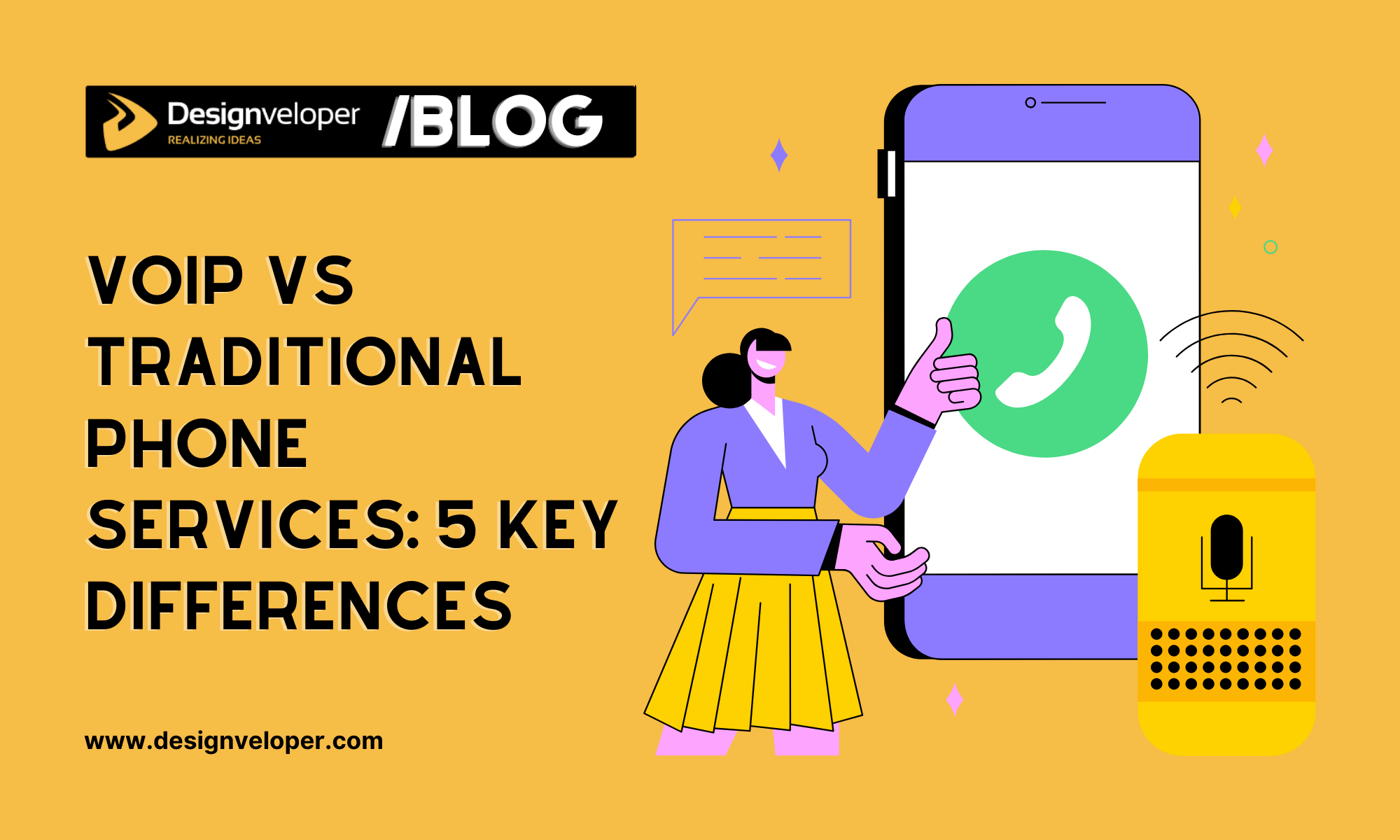
Good, stable communication channels are always crucial for businesses of all sizes. It’s because they help you connect with other team members and customers more seamlessly. While traditional phones have been around for ages, VoIP also appears to facilitate your communication process. But is there any difference between VoIP vs traditional phone services? Let’s discover the answer in our comprehensive article!
Understand VoIP vs Traditional Phone Services
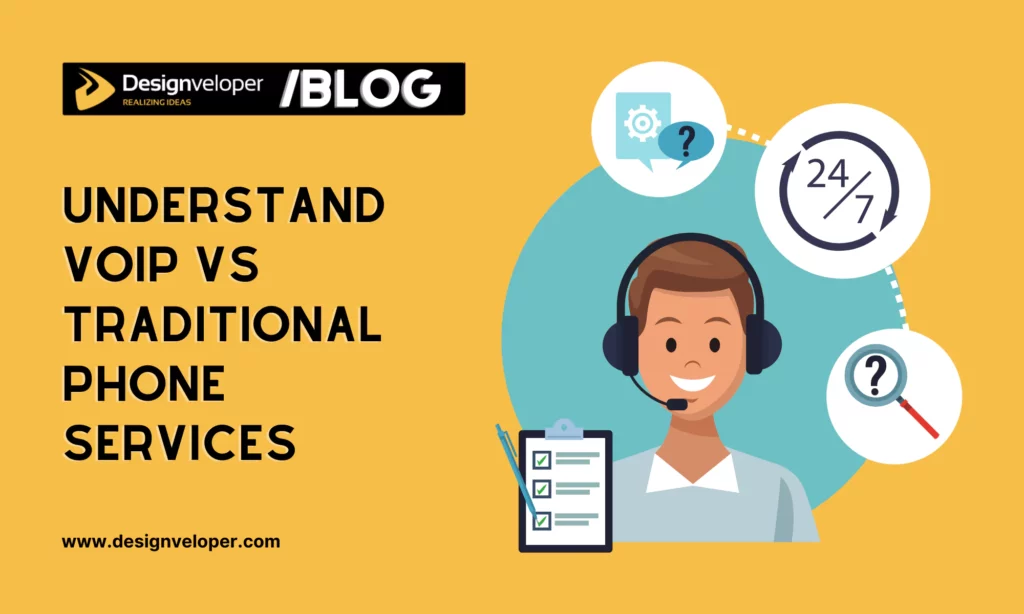
Before digging into our main topic today, we’ll elaborate on what VoIP and traditional phone services are.
What is a Traditional Phone Service?
Back in 1876, a traditional phone service started with the invention of Alexander Graham Bell. This opened a new era of long-distance communication. Soon after this successful invention, traditional phone services were commercially adopted for the first time in 1878 in New Haven, Connecticut. Quickly, they became a standard communication means for organizations worldwide.
Diving deep into these services, we all see their main purpose is to make and receive calls using the Public Switched Telephone Network (PST ). These services rely on physical phones connected to a wall by lines. These lines can be made of copper wires or optical fibers. For this reason, traditional phone services are often known as landlines.
How Does a Traditional Phone Service Work?
When you talk on a traditional phone (landline), your voice gets converted into electrical signals. These signals travel through underground cables to the nearest telephone exchange. This exchange is a hub that connects different phone lines. It finds the phone line of the person you’re calling. Your voice signals then travel through many exchanges until it reaches the other person.
What is VoIP?
VoIP stands for Voice over Internet Protocol. Unlike traditional phone services, it also allows you to make and receive calls through the Internet. For this reason, it eliminates the need for physical phone lines and systems. All you need for VoIP phone systems is an Internet-connected device, be it a smartphone, computer, or VoIP phone. Accordingly, VoIP can come into different types: 1) phone-to-phone, 2) computer-to-computer, and 3) computer-to-phone.
Compared to traditional phone services, VoIP is more popular. In particular, the global VoIP market is projected to reach an impressive value of more than USD 100 billion by 2032, with an annual rate of around 10% between 2023 and 2032. Also according to the research, this growth is attributed to different reasons as follows:
- VoIP offers more benefits than circuit-switched networks;
- SMEs (Small and Medium-sized Enterprises) increasingly adopt VoIP phone systems;
- 5G tech is thriving;
- Hosted VoIP solutions are becoming increasingly popular;
- More and more companies work toward mobility.
Meanwhile, landline phones will gain an estimated revenue of USD 8.5 billion worldwide in 2024. This figure then increases slightly at a CAGR of only 1.44% from 2024 to 2029 due to the growing popularity of mobile devices.
How Does VoIP Work?
When you make a call, your voice is changed into data packets. These small packets then travel over the Internet to reach the person you’re calling. At the other end, the data converts back into sound. For this reason, the other person can hear your voice just like a traditional phone call.
5 Key Differences Between VoIP vs Traditional Phone Services
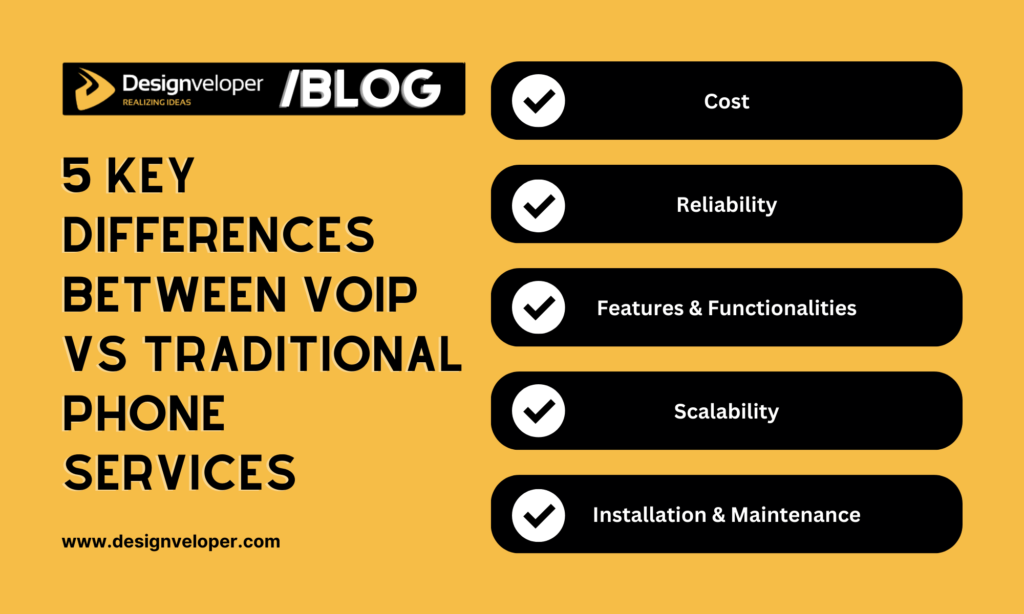
Once you’ve understood what VoIP and traditional phone services are, we’ll elaborate on the key differences between these services. They include cost, reliability, features, scalability, and installation & maintenance. Let’s get started!
1. Cost
VoIP often charges less than traditional phone services. As already mentioned, you need an internet connection to make and receive calls through VoIP. However, it doesn’t mean you need to pay only monthly internet bills for VoIP phone systems without caring about other expenses.
Depending on VoIP service providers, their pricing plans, and deployment modes (on-premises or cloud), you’ll get different charges. But below are several costs VoIP often covers:
- Call Charges: In fact, calling through the Internet doesn’t exclude call charges from your VoIP bills. Many VoIP providers like Nextiva offer free or low-cost plans for local and international calls. Others like Vonage, 8×8, or RingCentral provide per-minute rates for international calls.
- Hardware Costs: Some VoIP providers like Intermedia include or discount necessary physical devices to support your communication needs. They involve VoIP phones, headsets, adapters, and more.
- Advanced Features: Various VoIP providers offer a core set of features at no extra charge. They include call forwarding, voicemail to email, call recording, business text messaging, etc. Further, they also provide advanced functionalities with extra costs, like advanced call analytics, auto-attendant, and interactive voice response (IVR).
- Maintenance & Support Services: Some VoIP providers like Designveloper cover regular updates and maintenance of VoIP phone systems in the service plan. But others may require additional charges.
Landlines, on the other hand, typically cover monthly service fees for the physical phone line and some basic features. You’re also charged for long-distance calls, equipment rental, and possibly installation fees.
However, these traditional phone services can be more expensive than VoIP for several reasons. First, landlines require extensive networks of copper wires, which can be costly to install and maintain. Second, they’re technically tied to a specific location. This makes it difficult to change or expand your phone systems. Finally, it often covers higher costs for long-distance calls which are often charged per minute.
2. Reliability
Reliability is always the key to any phone service. This factor measures whether your communication through phones runs seamlessly.
Traditional phone services are known for their reliability. As such, they use physical phone lines that rarely go down. Even during power outages, traditional phones often keep working. This is because they rely on robust infrastructure that includes a vast network of underground cables and switching centers. Further, they have backup power sources (e.g., generators), constant monitoring, and isolated systems. All these factors reduce the failure rate of traditional phone services and ensure their dependability.
Meanwhile, VoIP depends on the Internet. This means its reliability relies on your internet connection. If your internet is fast and stable, VoIP works well. But if your internet is slow or goes down, VoIP can have problems. At that time, calls could drop or sound poor. Moreover, power outages might affect VoIP if there’s no backup power source.
3. Features and Functionality
Traditional phone services have basic features that allow you to make and receive calls. Although they don’t boast a myriad of advanced features, they still provide some helpful functionalities. They involve call waiting, caller ID, three-way calling, or anonymous call rejection.
However, these advanced features come at an extra cost. Further, landline phone services are often limited to one device per line. Therefore, adding new features or lines can be complicated and cost more.
VoIP, on the other hand, offers a wider range of advanced functionalities than traditional phone services. Different companies provide your business with different features based on your chosen VoIP plans and ultimate purpose. Below is an example of Nextiva’s pricing plans with different packages of functionalities:
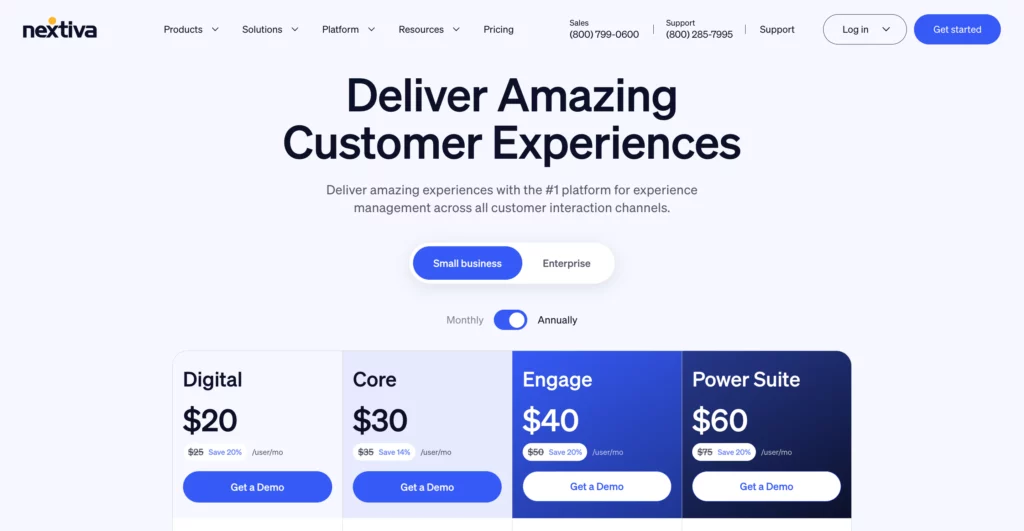
Or at Designveloper, we’ll offer different VoIP solutions depending on what you want to achieve eventually. In particular, we can build custom VoIP applications with features tailored to your unique requirements and specific industry. Further, we craft solutions that revolutionize your customer support experience through advanced features like call routing, IVR, and real-time analytics.
Our VoIP solutions can also support seamless communication for remote workers regardless of location. Such systems often include such functionalities as virtual extensions, mobile integration, and video conferencing to help your employees stay connected and productive from anywhere.
4. Scalability
Scalability is crucial when your business scales up or customer demands evolve. VoIP is considered very flexible. In other words, you might add new lines or users easily along with your business growth. This is typically done by upgrading your plan or maintaining your existing VoIP system. You don’t need to buy new hardware or install more physical devices (unless your current equipment is old-fashioned and needs replacing for better call quality).
Traditional phone services, however, are less scalable. You can require new hardware and installation. Not to mention that scaling down is equally a tricky task. You can be stuck with unused lines or equipment. Therefore, scaling up or down takes time and money when it comes to landline phone services.
5. Installation and Maintenance
It’s much easier to install VoIP phone systems. All you need is an internet connection with compatible devices. Various VoIP systems are designed to be plug-and-play. This means you only need to connect your devices to the Internet (via Wi-Fi or Ethernet cables) and follow basic instructions to set VoIP up. You, accordingly, might remove the need for complex wiring or physical phone lines. This makes the initial setup quick and user-friendly.
Further, maintaining a VoIP phone system is easy as well. Your service provider can handle most of the maintenance remotely by automatically delivering updates over the Internet. For this reason, your VoIP system is always updated with the latest features and security enhancements. If any issues arise, the provider can resolve them quickly through remote troubleshooting. This minimizes the need for on-site technical support and reduces downtime.
Meanwhile, traditional phone services demand more effort to set up. This involves installing physical wiring and phone lines throughout your office. Further, it can require you to drill, cable, and connect different components, which can disrupt your workspace.
Maintaining a landline system means regularly checking and repairing hardware and physical lines. If something goes wrong, you may need a technician to come on-site to diagnose and fix the problem. Not to mention that upgrading the system can also be complex as it needs additional hardware and installation work.
Summary Table: VoIP vs Traditional Phone Services
You’ve already learned about the visible differences between VoIP and traditional phone services. Now, we summarize these differences to see which pros and cons the services bring us:
| VoIP | Traditional Phones | |
| Pros | – Cost-effective – Flexibility and mobility- Advanced features (call routing, real-time analytics, etc.)- Scalability- Easy to install and maintain | – Reliable and stable connection- Consistent voice quality- Widely accepted and understood |
| Cons | – Dependence on an internet connection- Potential for going down or being slow in case of power outages- Voice quality can vary | – Higher costs- Limited features – Lack of flexibility- Struggle with changes or expansions in landline systems. |
Which Service is Better for Your Business?
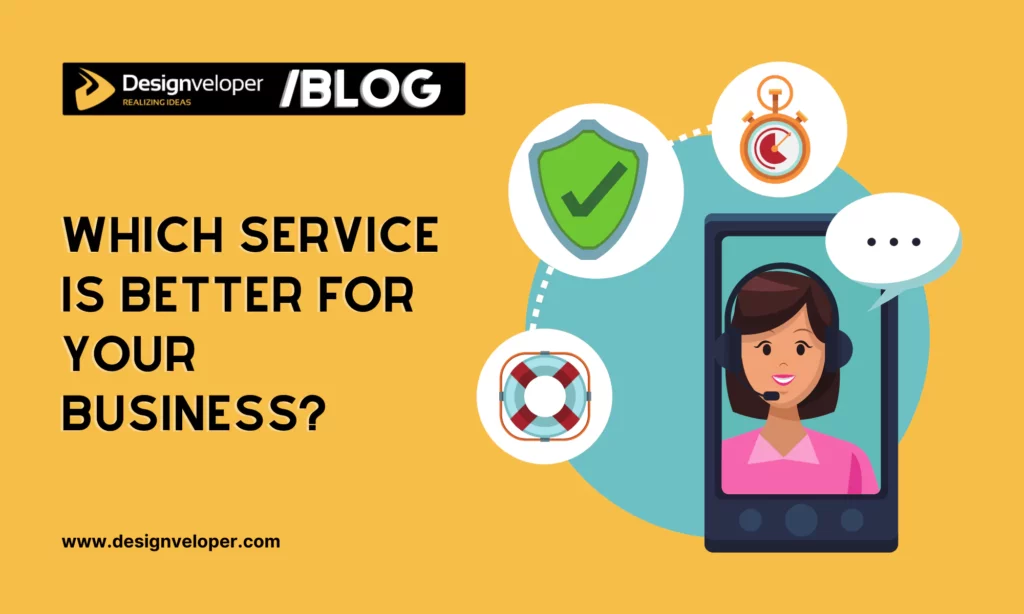
Despite its many benefits, VoIP may not always be the best option for your business. Therefore, choosing between VoIP and traditional phone services relies much on your specific needs. In particular:
- VoIP is a great choice if you want to save money and enjoy scalability. It’s also perfect for those who need advanced features like video calls or call analytics. Further, consider VoIP if your team needs to communicate on the go using mobile devices or remote work setups.
- Choose traditional phone services if your location has unreliable or unstable internet connections. Additionally, they’re ideal for those requiring consistent call quality and only basic call features.
After understanding the right scenarios for each phone service, consider the following factors to understand your communication needs better. They’ll help you make an informed decision on which service to choose.
- Business Size or Industry: Is your company just a startup, an SME, or a large enterprise? Which specific industry does your company work in? Ask these questions to comprehend which service will fit your business domain and size. For example, small businesses that require simple communication might choose traditional phone services.
- Budget: Next, assess your budget for communication services. VoIP often offers more cost-effective solutions, especially for those with high call volumes or international communication needs.
- Need for Advanced Features: Does your company require advanced features like video conferencing or integration with other software? If not, traditional phone services are well-suited for your business. Otherwise, select VoIP which provides those functionalities at no or a little extra cost.
- Internet Reliability: You may not want your communication to be interrupted by a poor internet connection. So, evaluate the Internet’s stability in your company’s location.
FAQs: VoIP vs Traditional Phone Services
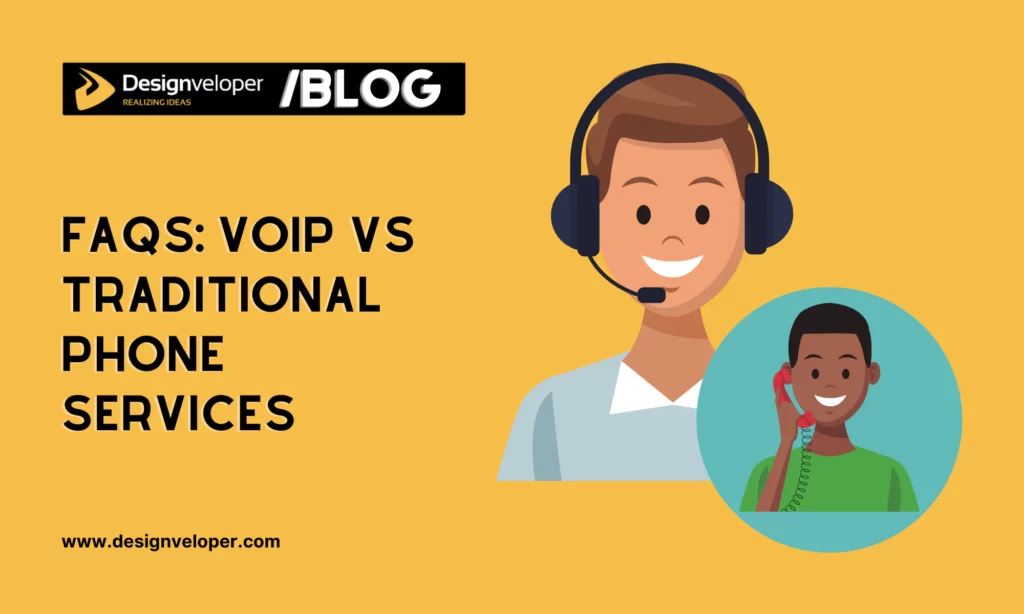
Now, you’ve understood the main points revolving around VoIP vs traditional phone services. Let’s move to the final section where we’ll elaborate on some common questions regarding these services.
Question 1: How secure is VoIP compared to traditional phone services?
The answer here is: it depends.
VoIP depends heavily on an internet connection, as we already said. This, however, raises a big concern about the risk of VoIP phone systems being prone to cyberattacks like hacking, phishing, or DDoS attacks. Accordingly, threat actors can access call records, voicemails, and other sensitive information.
But it doesn’t mean traditional phone systems are more secure than VoIP. Basically, landlines can be vulnerable to physical tampering of lines or equipment. Even if you use a landline for your business, threat actors can eavesdrop on your conversations. Some tactics these attackers use include wiretapping, phone line interception, access to compromised devices, and insider threats.
Despite these risks, remember that modern VoIP phone systems now use robust security measures like firewalls, encryption, and software updates. Also, the level of security depends on your provider and user practices, not only for VoIP but also landlines. Choose a reputable provider, follow the best security practices, and inspect your phone infrastructure regularly.
Question 2: Can I use my existing phone number with VoIP?
Yes, you can use your current phone number with VoIP. This process is often known as number porting. Most providers now offer the option to port your existing phone number to their VoIP service. This enables you to keep the same number without any interruption in service.
All you need to do is provide the provider with the necessary information about your existing phone service to ease the transfer. This process normally takes a few days to complete.
Question 3: Can I use my current internet connection for VoIP?
Of course yes. However, you should consider the following factors to ensure a smooth and reliable VoIP experience:
- Bandwidth: VoIP needs a stable and high-speed internet connection (at least 100 kbps upload and download speed per call). Therefore, your internet connection must have adequate bandwidth to handle VoIP calls.
- Connection Stability: A stable connection is important for VoIP to work smoothly. Frequent drops or high latency may affect call quality. So, ensure connection stability when using VoIP.
- Quality of Service (QoS): If your router supports QoS settings, configure it to prioritize VoIP traffic. For this reason, you can get sufficient bandwidth for each VoIP call, even when your network is busy with other activities.
- ISP Compatibility: ISP is short for Internet Service Provider. Although most ISPs support VoIP, check with your provider to ensure VoIP usage isn’t restricted.
- Network Equipment: Old devices can hinder your VoIP systems from performing well. Therefore, update your modem and router if needed to ensure they’re capable of addressing VoIP traffic effectively.
Question 4: What happens if the internet goes down with VoIP? Should I keep a landline in case of emergency?
One bad thing about VoIP is that it can be disrupted when the Internet goes down. This can interrupt your conversations with other members and customers. In this case, we advise you to adopt the following solutions to reduce this issue:
- Backup internet connection: Having a secondary internet connection can help your activities and communication continue smoothly.
- VoIP provider feature: Some VoIP providers integrate some features like call forwarding to mobile devices or other locations when the Internet goes down.
- Analog backup lines: A traditional landline can operate during the internet or power outage. Therefore, maintaining one can be a reliable backup, especially in emergencies.
Question 5: Is VoIP suitable for international calls?
Yes, VoIP is highly suitable for international calls for several reasons. First, it provides much lower rates compared to traditional phone services. Second, it’s extremely beneficial for making video calls across long distances. Third, it comes with such additional features as call recording or conference calls, which benefit international business communication.
Conclusion
After this article, we expect you to be better equipped with essential knowledge of VoIP vs traditional phone services. It covers their core differences, how to choose the right fit for your company, and frequently asked questions. Assess your specific communication needs and consider the information we provided in this guide to make an informed decision. If you’re curious about different VoIP topics, subscribe to our blog!

















































